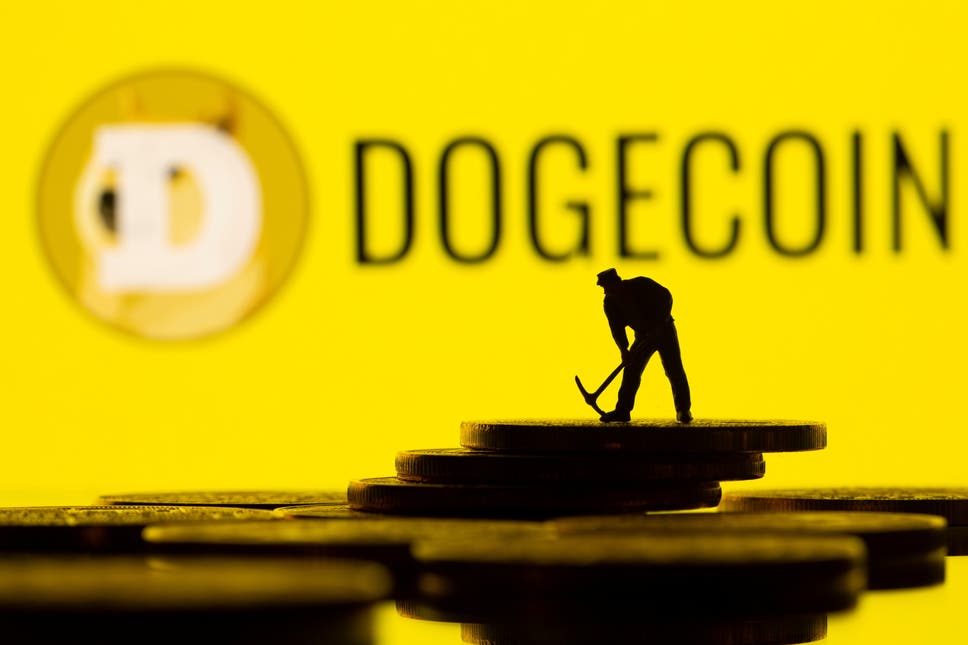It was Doge day afternoon all over again on Wednesday as Dogecoin (DOGE) continued its assault on the cryptocurrency market capitalization rankings. The meme coin overtook XRP to become the fourth-largest cryptocurrency by implied market capitalization after climbing to an All-Time High of $0.69 per-coin valuation — a target that was specifically set by traders on social media.
But cryptocurrency’s latest media darling may not be as wholesome as it seems. For all the hype surrounding Dogecoin (and its de facto master, Elon Musk), publicly available data suggests relatively few people are actually using the blockchain and those who do use its account for an incredibly large portion of its overall activity.
Consider that the dollar value of coins sent across the Dogecoin blockchain on Tuesday exceeded $58 billion. That figure was 70 percent higher than the amount transferred on Bitcoin ($34 billion) and 260 percent higher than on Ethereum ($16 billion).
Digging into on-chain data further, we see that despite Dogecoin moving a higher value of coins than the two largest cryptocurrencies in the world, it achieved this with a mere fraction of their transactions.
Over 1.4 million transactions were counted on the Ethereum blockchain yesterday, according to data from Bitinfocharts, while close to 300,000 were counted on Bitcoin. Compare this to just 76,000 recorded on the Dogecoin blockchain, and an apparent wealth gap begins to emerge.
Indeed, when looking at Dogecoin’s average transaction value on the day in question, it stood at almost double that recorded on Bitcoin (BTC). The average DOGE transaction value stood at $800,000, compared to $420,000 on BTC. Its statistics relative to Ethereum paint an even more dire picture — Dogecoin’s average transaction value exceeded Ethereum’s by 8,000 percent, despite processing only 5 percent of the number of transactions.
Combined with the long-standing reality that one single address holds 28 percent of all coins in existence, while just 12 accounts for 67 percent, it becomes clear that Dogecoin isn’t exactly the people’s champion that interested parties would have the public believe.
A recently published report by Galaxy Digital piled on the misery regarding Dogecoin’s general lack of authenticity as a true cryptocurrency project. Titled “Dogecoin: The Most Honest Sh*tcoin,” the report highlighted the fact that Dogecoin’s GitHub repository (where updates to the blockchain’s code are logged by developers) hasn’t been touched since 2017. What’s more, the number of fully synced nodes (computers running copies of the Dogecoin blockchain) is just 26 percent of the overall node count, suggesting few people are willing to make the effort to maintain the blockchain’s network security.
But even if the Dogehouse seems like a ghost town, the glaring reality remains that Dogecoin is the best performing digital asset in the cryptocurrency space. The coin has recorded 14,000 percent growth since Jan. 1, when it was priced at a fraction of a cent.
Both credit and blame for Doge’s seemingly irrational ascent have been placed on the “Dogefather” himself, Elon Musk, who has taken great pleasure in posting Doge memes to his 52 million followers on Twitter throughout much of 2021.
However, it should also be noted that the coin’s recent peak of $0.69 is the same price target set by Reddit traders intent on artificially pumping DOGE’s valuation. The price point was originally intended to be reached on April 20 — a joke on top of a joke on 4/20 day. Dogecoin only reached a price of $0.420 at the time (boom), but now, a little over two weeks later, it has finally achieved its jocular goals. The ultimate price point being pursued by traders is $1.
If more evidence is needed that markets are not always rational, look no further than this year’s GameStop pump, where the share price of a near-dead brand increased by over 9,000 percent.
“Dogecoin has always been a joke, and the joke keeps getting funnier,” stated the Galaxy Digital report. Author of the report and head of firmwide research at Galaxy Digital Alex Thorn did praise Dogecoin for its lack of pretense, noting that the coin’s fortunes weren’t tied to foundation announcements or developer promises and that its only goal was to elicit a reaction.
“Dogecoin’s longevity is ensured so long as one truism remains: people love a good joke,” Thorn ended.


 Forex3 weeks ago
Forex3 weeks ago


 Naira2 weeks ago
Naira2 weeks ago
 Billionaire Watch2 weeks ago
Billionaire Watch2 weeks ago




 Naira2 weeks ago
Naira2 weeks ago




 Naira4 weeks ago
Naira4 weeks ago




 Naira2 weeks ago
Naira2 weeks ago


 Naira7 days ago
Naira7 days ago
 Banking Sector4 weeks ago
Banking Sector4 weeks ago





















